
Posted on: Nov 26, 2018
About building bridges on daily basis, gremlins in our heads and the probable results of future technology advancement- feel welcomed to read the interview with
Michał Ejchman, Program Manager in Adaptive Group.
Irmina Liczbik: Michał, if you could introduce yourself please.
Michał Ejchman: My name is Michał Ejchman. Currently, I work in Adaptive Group. My main areas of interest and responsibilities are clients from BPO, Shared Services and Global Business Services who seek for support within finance & accounting processes, either from the perspective of intermediate team management or analysis of the current situation within F&A processes in order to advice areas for transformation.
What do you like most in your job?
I like meeting people and learning about them: customers, employees and their companies. How they operate, what is their history and corporate culture. It fascinates me because both history and culture is a mixture of many various ingredients. When you go deeper into it, you start to understand that there are things which, at first, seem to be a wrong idea, but operate quite well as a result of the cultural mix.
Secondly, I love visiting new places and countries. If only time allows me to learn more about particular city or culture, then my trips are even more inspirational and astonish me.
So you really enjoy travelling. Is there any trip that has a special place in your heart?
Trip that has a special place in my heart? Surely my first travelling project to Netherlands when I was able to see quite flat world. Not only plain landscape (no mountains nor hills nor rocks), but also organizational culture, where everyone is even. It was quite new for me how people can treat each other and how great can a cooperation look like. Not so simple 15 years ago.
Obviously, my trip to India. It has showed me how enormous the globe is and how small is Europe. It was amazing to experience the multicultural cities: a mixture of tradition and aged machinery with really modern technology. Men pooling rikshaw and talking by phone. Poor villages with metal huts and satellite antenna on the roof. Manual sugar-cane juice squeezer advertised on Facebook and Twitter. And on top of this, the best culture-crucible symbol I have ever met: the taxi driver having on his dashboard Jesus, Buddha and Lakshmi.
Coming back from India, we also visited Turkey, Istanbul. Being able to see Hagia Sophia next to the Blue Mosque was extraordinary. They exist together even though the history of those two religions is quite turbulent.
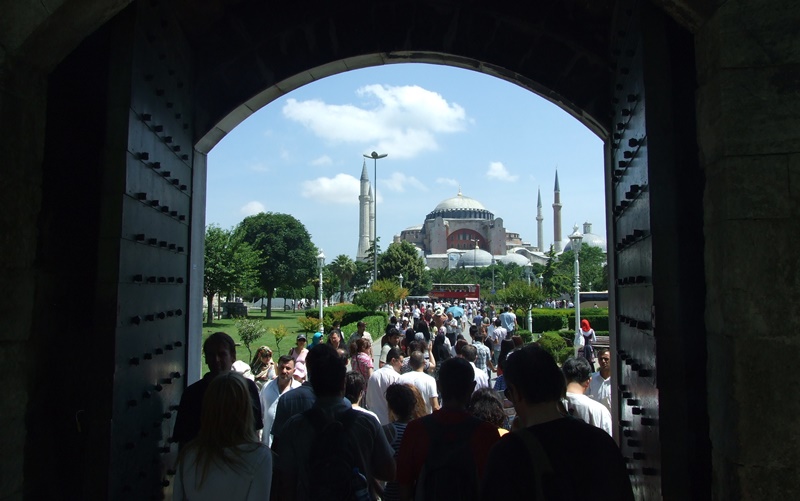
Hagia Sofia
South Africa, Johannesburg- a colorful mixture of cultures. This is the country where people openly talk about things not so diplomatic in Europe (or so called ‘Western Cultures’) explaining the rationale, reasons and behaviors. Great example of how language and unfettered communication helps you to accurately interpret the situation.
However, I also appreciate short-distance visits like the one to Czech Republic. I had a six-month project there. Before the project, I assumed we will work in a similar way, like in Poland, but the differences were quite big. As I learned about Czech history and Czechs’ way of looking at the world, I began to understand the differences and was able to change my language.
From what I know, you are interested in bridges and you have also visited USA. I guess it was a great opportunity to see one of the most famous bridges?
Yes and no. In USA, I have seen a number of Chicago bridges (DuSable Bridge, Northwestern Railway Bridge, and many, many small ones). Not very famous and big ones but very interesting and beautiful. They are not only functional but also bring some artistic footprint to the city. However, the most beautiful ones – designed by Santiago Calatrava – are still on my “to-be-visited” list.
Apart from the USA bridges, I also had an opportunity to see the Bandra-Worli Sea Link in Mumbai which allows to bypass a particular part of the city and Mahim Bay. It is really beautiful. We decided to cross it to take some pictures and use them it in the company’s leaflet. On the way back we couldn’t miss the opportunity to see it from the beaches of Mahim.

Lesotho
Why are you interested in bridges? I mean, it is not a usual interest, is it?
There are lots of layers and messages and gifts from a bridge. Let us say you build a bridge between two banks of the river. After some time, you can start observing how the culture of the two banks changes: people start to interact with each other more often, they start to exchange goods and values as well as languages and wisdom. Result? The growth of the economy and culture on both sides. When you look at the map of Europe, you can see plenty of big cities, old ones, which expanded when someone had built a bridge. You can see it in Cracow, Prague, Warsaw, Vienna, Buda-Pest etc.
Bridges are also a physical representation of what we do in our lives on daily basis. We build bridges between each other to co-exist, to understand each other, improve relations etc. It is natural, especially when we tend to secure our own comfort zones by building walls around us. The walls give us a sense of safety, but without bridges, they cut us from other people. For example, IT teams or F&A departments tend to build siloes, as it allows them to communicate easily. I’m sure each of us had experienced a situation, when some IT geek explained why internet is not working?
A lot of specialized terminology…
It’s because s/he got used to talk in this language to other colleagues from his/her team. It is fine until you talk to someone outside your silos. Then you need to change your language – you start to build a bridge. And imagine what happens when IT talks to Accountant – two different worlds. Personally, it was really satisfying to me to maintain relations and build interesting IT projects with accountants.
What I am most proud of, are the bridges that I have built between Johannesburg, South Africa, Lodz and Bangalore, India. I was responsible to integrate 15 people, South Africans who were moved from our customer to Infosys. I had to make sure the operations we took over are stable during the takeover. But also, at the same time, make sure all the colleagues feel safe in the new company. For me, it was quite important to build connection points to Lodz operationally and to India from the legal perspective. Quite long bridges, aren’t they? What’s more, I still have friends there. That is why bridges have such a meaning for me.

Bridge in Budapest
What is the place of coaching in your bridge? I know you are also interested in that area.
All of us aim to the next level. Maybe you want to have better grades or job or improve particular skills etc. There are 2 ways to do it: either you start some course in order to get the knowledge and experience you need and/or you already have those skills/possibilities but for some reasons you are stuck. The voices in your head keep telling you “You cannot do it. You will not succeed”.
I call them gremlins. They try to keep you away from the next level. As a coach, I have learnt what are those gremlins and by conversation, I help people start profiting from them. By the usage of available tools, ways to discuss the matter we learn the mechanism standing behind gremlins and how to gain control over them. We can say, it is the process of building a bridge between you and gremlins. But also being on the bridge allows you to look at the challenge from much broader perspective. You stop wasting your time and energy to fight with the river current and you can focus on your goal.
How do you know whether to pursue a goal or not?
I am afraid there is no universal answer. I do not want to say you should keep trying and saying “yes” to everything because otherwise you’re a loser. It is not right. One of my friends in South Africa told me “Clever people learn from their mistakes but wise people learn from mistakes of others”. Sometimes the answer is obvious, for example, you already know you should not experiment with drugs – the risk of failure is too high.
Maybe you have heard this quote about the ship and the port: the ship is built to go to the sea, not to stay in the port. But the most successful ships are those which have the harbor well established. The harbor is also a kind of bridge. If it is well established, you feel save while sailing away to the sea because you know there is always a place where you can come back, relax and unload the “cargo” of your knowledge and experience. You need to have and know this harbor. Whether you go or not – it is your decision.
Following your metaphor- what is your wind?
For sure, all the things I have already mentioned – meeting new people, learning about different cultures. The relations that I have been able to build and maintain. What is more, being able to reuse my experience and ideas, the opportunities I was able to spot and suggest a positive change. To have impact, to be able to choose: either follow the crowd or find another path. Being the “builder”- this is my wind, fuel that drives me.

You mentioned IT. I want to touch upon quite a controversial topic: the bridge between humans and technology. How do you see its future in the next few years?
The speed of investment in new technologies as well as the speed of new inventions is growing exponentially. About 10-15 years ago, there was a slowdown in the possibilities to sell those innovations to the customer. In my opinion, it was caused by the customers’ inability to “digest” them. We all came to the point – a kind of threshold – where we were not able to grasp more. For example, the VHS. It had so many innovations that the remote control contained a lot of buttons. However, the users used about 20% of them. Why? Because in reality, they needed only few buttons. At that time, the producers who focused on simplicity were able to succeed. For instance, Philips focused on “Sense and simplicity” and Apple won the customers’ hearts because their electronics contained as less buttons as possible. Now look at our smartphones. I expect that such situation is going to take place soon.
Inevitably, the future technology will make us lazier and use less muscles, including brain. For sure, new jobs will appear on the market. Some people may be afraid of losing work but… The moment when ATM appeared in banks, there were also some concerns expressed by the employees. But when you look at the statistics – the number of bank employees has grown dramatically. Why? Because the advancement and the service provided by banks is much bigger than it used to be in the past. We use banks not only to store money but also for other purposes (transfers, insurance etc.). So for sure, new jobs will keep appearing.
Actually, we can see it on the Polish market even right now. On the one side, plenty of people cannot find jobs in their profession. On the other side, many companies are not able to find employees. It is mainly because people are not adaptive, they are not able to change their approach towards the market. We (Adaptive Group) are lucky because we are in the one of the newest and most advanced branches, but imagine: I could have stayed in the carpenter shop where my professional career started…
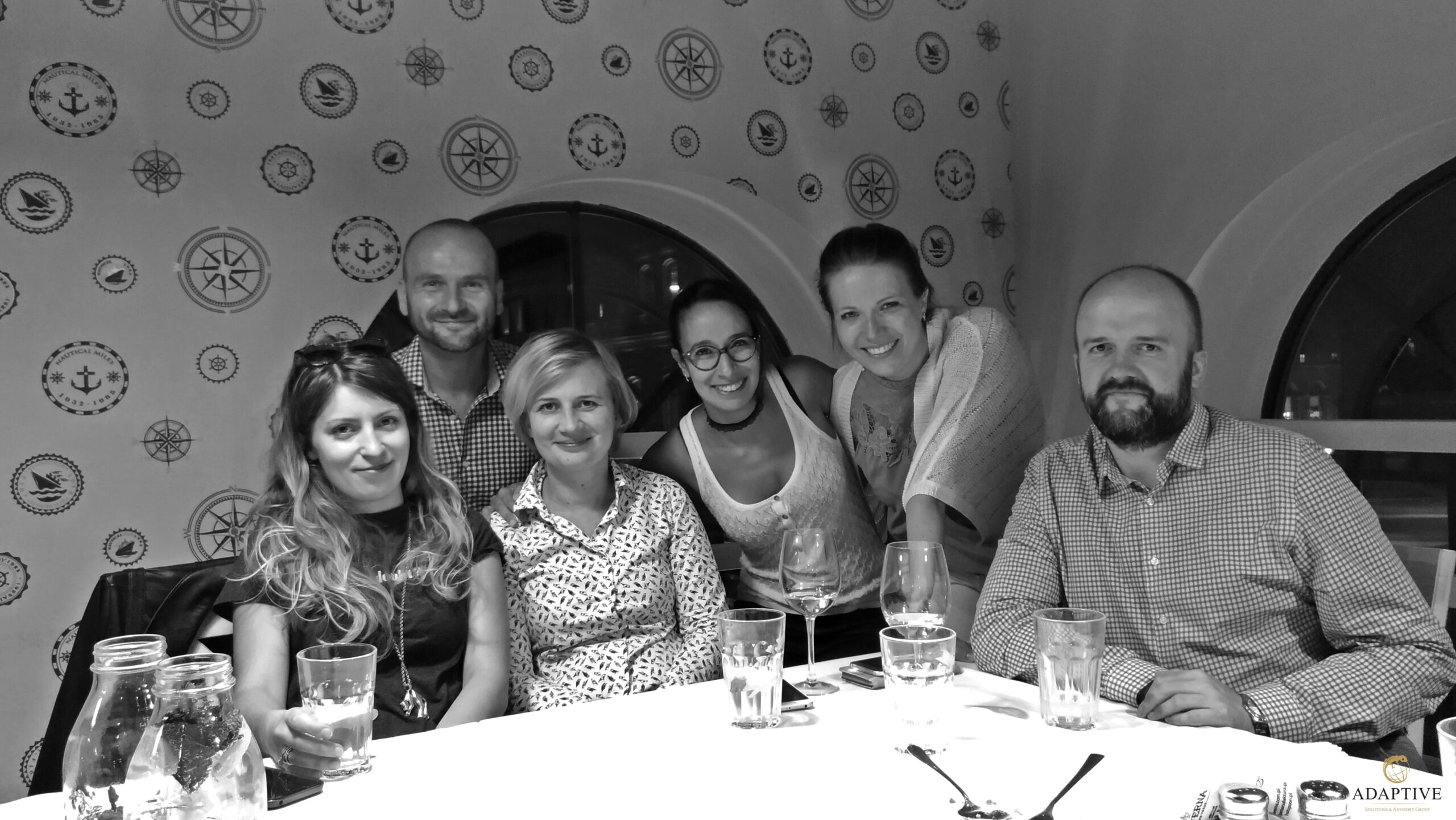
Michał Ejchman together with other consultants celebrating the SSC Rescue Rangers success
What is more, the advancement will allow us to use robots and automated tools within the service area which for a long time was not possible, mainly because service area is not homogeneous. The activities to be performed are not the same, you need to take into account many different aspects. However, the tools and the computing power possibilities are more and more advanced which allows to code and build exceptions to the standard way of working.
Moreover, the machines are able to learn more and more exceptions from observing the job itself. If only it is done correctly, with no mistakes, the software will be able to repeat it. At the same time, we observe the urge to unify and standardize the services in SSC environment to make the job repeatable by automated tools. This is the way how those two banks of the river (machine learning and standardization) will meet in the middle.
Lastly, there will be plenty of jobs connected not only with coding the machines but also, the market will experience a huge demand for people who understand the reasons standing behind the machine’s actions. There will be a growing necessity to understand how the machines work in order to control them and make sure the mistakes will not be repeated. Can you imagine the same error repeated by thoughtless device million times? We need to learn how to avoid it and how to re-teach the robot to keep performing properly. The language of technology is the most important to learn because otherwise we will stay behind.
In Adaptive Group, you sometimes take care of recruitment. How about the implementation of technology in this area?
I see some examples of dehumanizing the whole process of recruitment by using chatbots and extensive emailing. For me, the technology will help and already gives us support because the candidates do not have to send CV on paper to the company. We use email and, in many cases, we have interviews via skype or video conference. In such cases it does help.
However, we cannot forget that there are real people at the beginning and at the end of this process. Humans enter the data to the resumes and candidate database. Even if you have a robot which reads the data from the CV it does not take into account that someone wrote this CV to impress and appear to be the best candidate, not necessarily to provide all the facts needed. In order to wisely use the technology and robots, you need at least some extend of understanding. Still at the end of the day, there should be a face to face meeting to understand each other, learn about the facts and initiate building a new bridge.
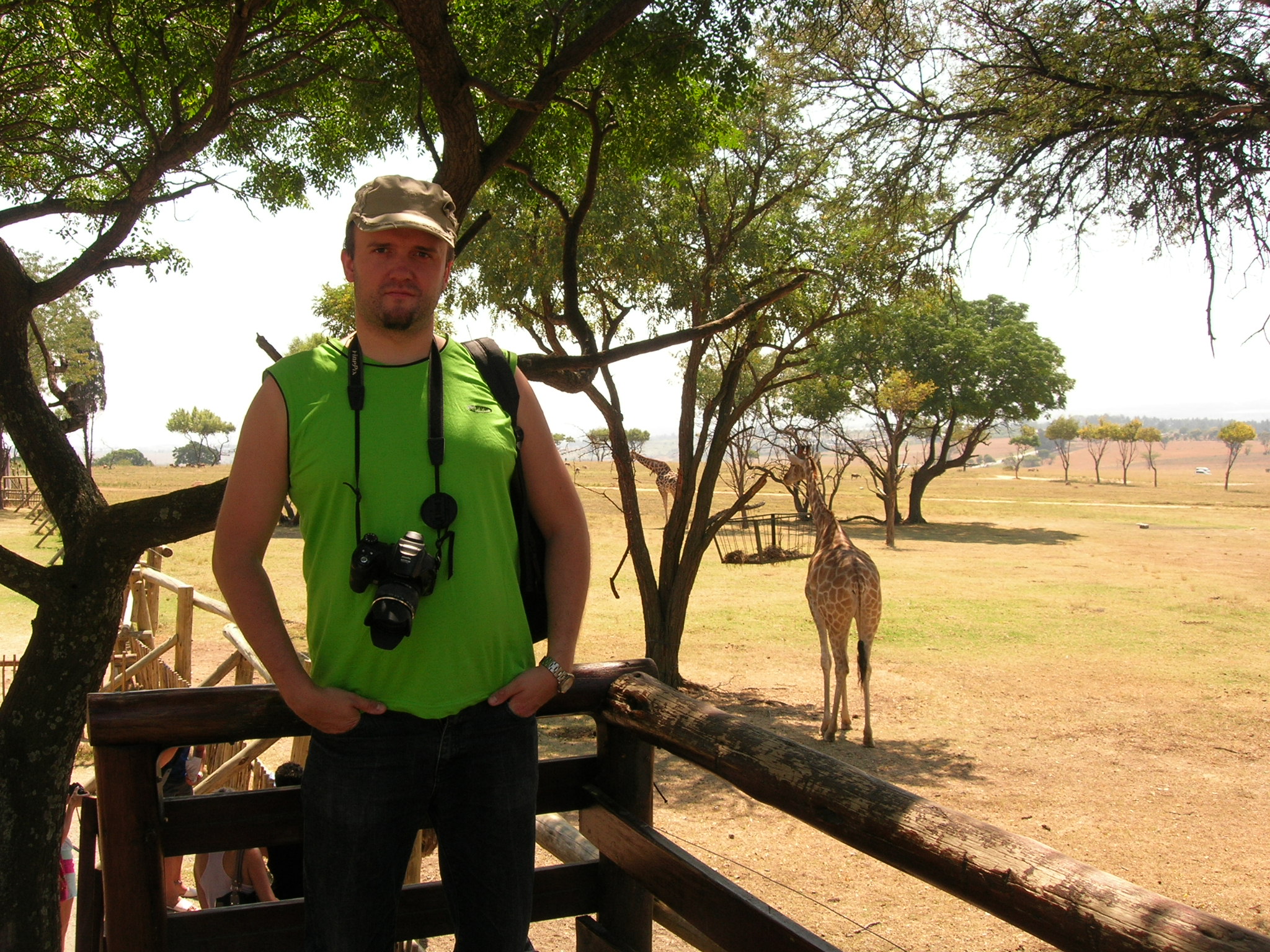
If you were to say, what is the most important trait of character when it comes to recruitment. What are you looking for?
If we are talking about recruitment of Juniors to Adaptive Group Team: the attitude, eagerness to learn and deliver, the need to understand more and ask as many questions as possible. It is the key for me. Then of course language is absolutely a must especially in the client’s company. In most cases, it is English.
All the rest we can teach. If only you are a person with the proper attitude, curiosity and eagerness to learn, then you will easily start entering invoices to the system or reconciling the balances.
Another group we hire are advisors – the experienced individuals with consultative and analytical skills. In all cases, we appreciate the adaptability to changes and readiness to ship out from the harbour into the deep ocean.
You mentioned languages. Is it not quite ironic? We have a lot of machine translators and tools introduced and still you say it is crucial to know languages. Do you think it is going to change?
A machine translator translates only words or sentences. So far, there is no machine that is able to translate what is between the lines. That is why it is so important to meet from time to time in person and know how to speak a given language.
What is more, as it is said by many specialists, communication is mostly based on body language, the tone of our voice and how we behave during the conversation. Not to mention that still the semantic aspect might be quite crucial. Small differences between two similar words may destroy the whole project so you need to build the bridge between you and the customer. You will not be able to do it by using a machine translator I believe.
There is one language that you know which may be surprising for the readers…
I know sign language. Being CODA (a child of deaf adult) in many cases means that from the very beginning of your childhood you go with you partners and act as a translator in the shops, offices etc. You learn both languages and try to balance between them. It also includes learning to recognize emotions- in order to translate the meaning to sign language you need to understand emotions. Face to face meeting is slightly easier but by phone it may be challenging. Building such communication bridge means not only translation, but also understanding of culture. The deaf culture in Poland is completely different than hearing one because of the way educational system is defined for kids with hearing disabilities.
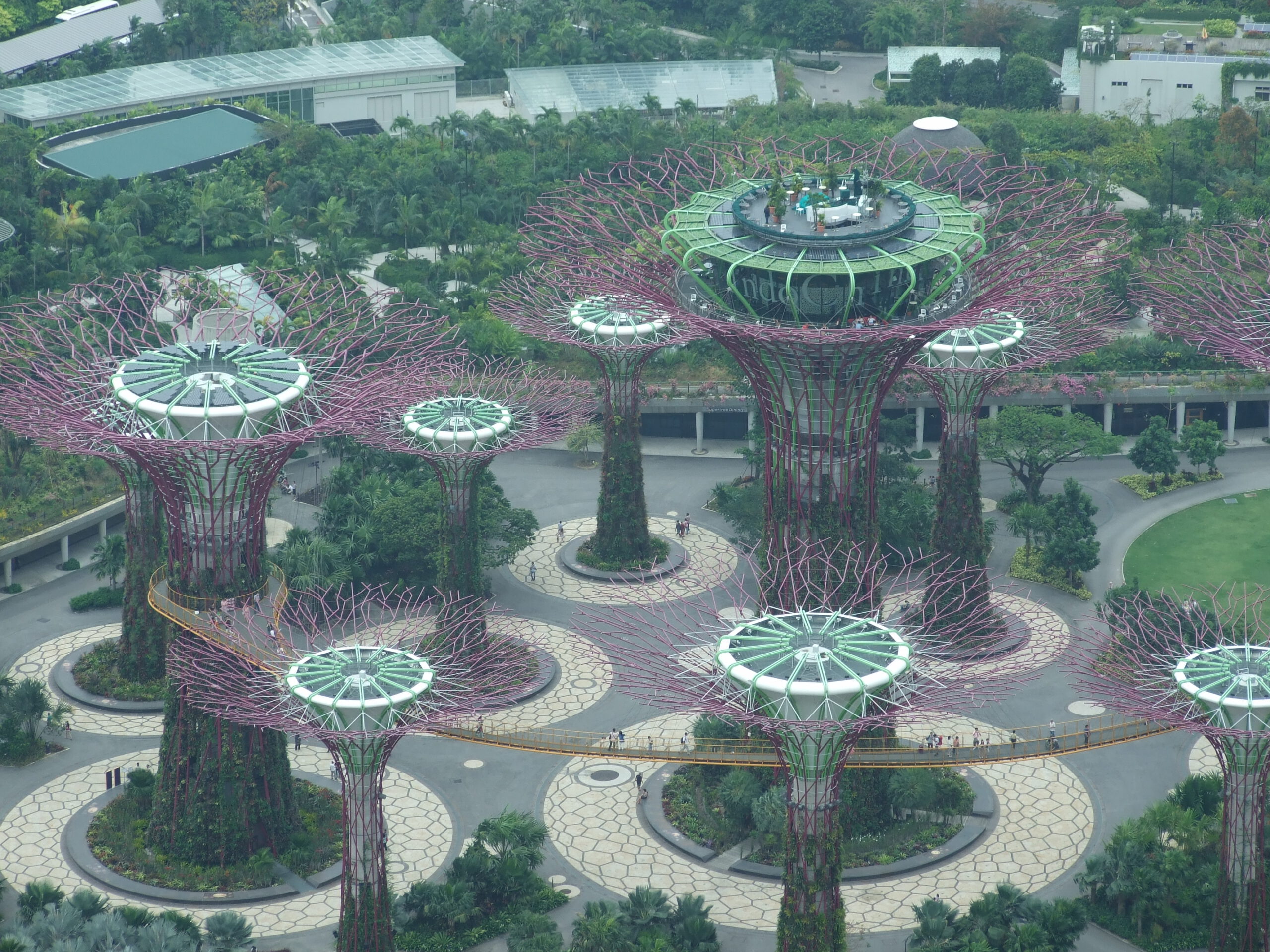
It is not common to use sign language. I mean, you are the first person that I have met who knows it. Can you tell something more about it?
This is my mother tongue. I do not use it too much; however I know it just like you know Polish. This is the language where you use your face, hands and body really extensively to communicate. You need to see each other in order to talk so even starting a conversation is already quite interesting – how to make sure that the person knows you started a conversation?
The language gives an impression of being simplistic. Some people tend to say you are able to discuss only simple ideas with this language. It is not necessarily the case. For sure, to some extent abstraction is quite challenging to talk about, mainly because of the semantic of the words which are in some cases untranslatable. On the other side, the emotional aspect is much more wider and much more flexible. You should see poetry in sign language… it is so amazingly beautiful and untranslatable to oral language I am afraid.
What may be surprising for some people is that sign language is not universal across the globe. It is not even universal across Poland. Of course, some signs are similar, for example, physical things (like ‘cup’, ‘leg’) which you can mime with your hands. But when it comes to other words, they may differ. Moreover, this language is alive which means it keeps changing and evolving. It is very difficult to use Polish sign language and speak Polish at the same time. The way of building sentences is completely different.
Let us go back to the area of consulting. Why have you decided to work in such a field?
For a long time, I did not want to work in consulting. The jobs available on the market gave no possibility to provide the type of advisory I am able to provide right now in Adaptive Group. I did not want to be a consultant in the shape that market wanted me to be.
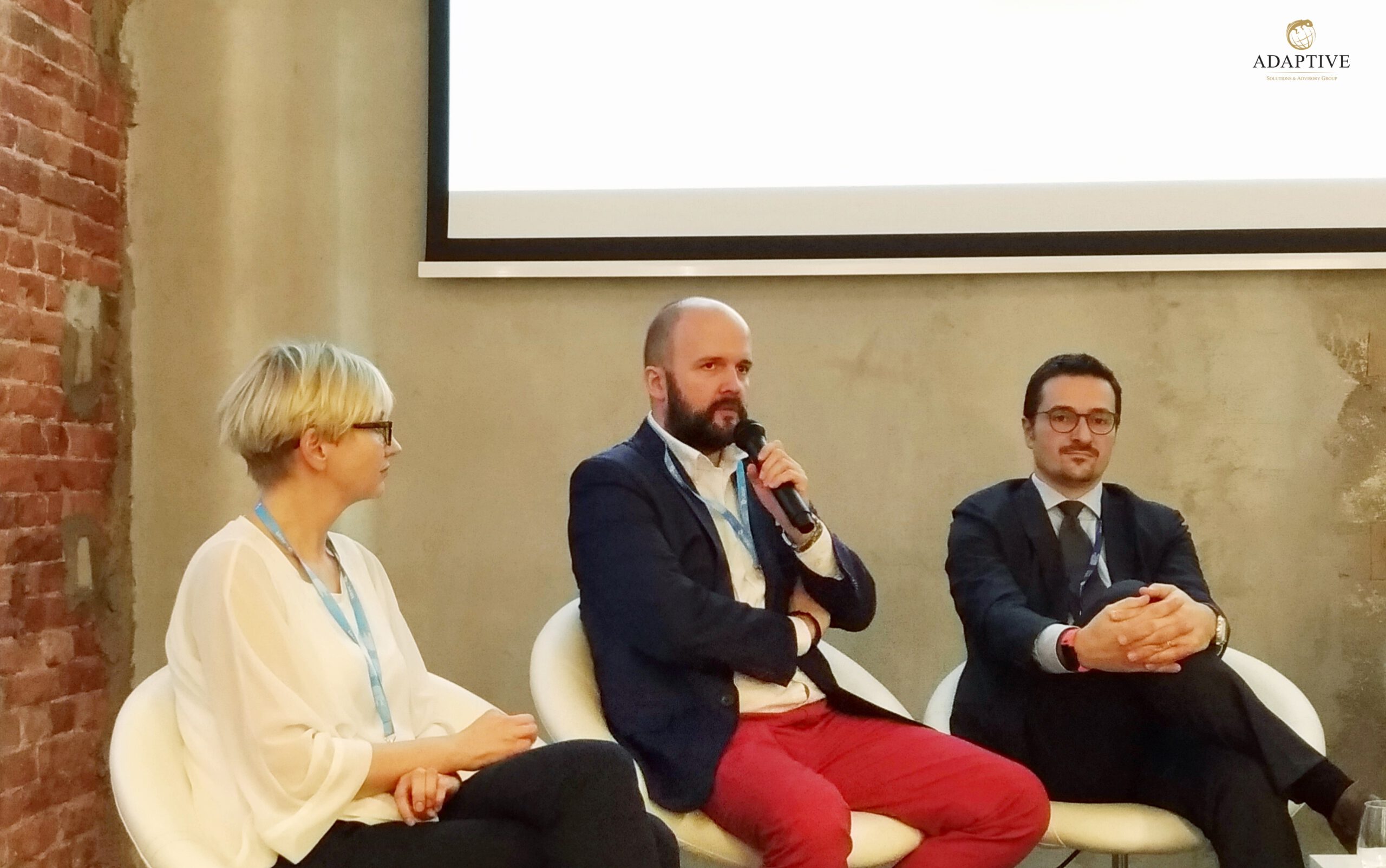
Michał Ejchman as one of the speakers during the XI European Economic Forum Lodzkie 2018
So you wanted something more and the answer was “No. In our company we work like this and this.” What has changed your mind?
Mainly, the way Adaptive Group is shaped. We are given the time and possibility to learn and meet the customer first- before we give the so called “advise”. When I saw that actually Adaptive is operating the way I prefer then it was clear for me that yes, this is the advisory I want to take care of. Another important factor? People who build this team. We all are doers – the majority of our experience came from actually maintaining the tasks or managing the processes we are consulting now. The hands-on knowledge comes mainly from operations we have been in or supported.
Tell me please, what the customer should take into consideration when thinking about advisory?
You can have it two ways: either you grow the consultant inside your own company or you hire the external one. If you decide to follow the first path, then you will have your own consultant, the person who has known the company for years and knows the company’s culture. It always brings a risk to lose this person (who would “pursue challenges outside organization”). Not to mention, that the person may not be motivated enough or just bored staying in one place, not being able to force the glass walls or ceiling. If you have your home-grown specialist, in some cases you tend not to listen to them. There is not always a room for constant improvement. On the other hand, you can hire an external person for a given period of time to start looking for improvement opportunities and you pay for service just once. In my opinion, the best option is to invite a group of consultants who will first learn about the organization and culture, build advise road-map and implement the most promising solutions.
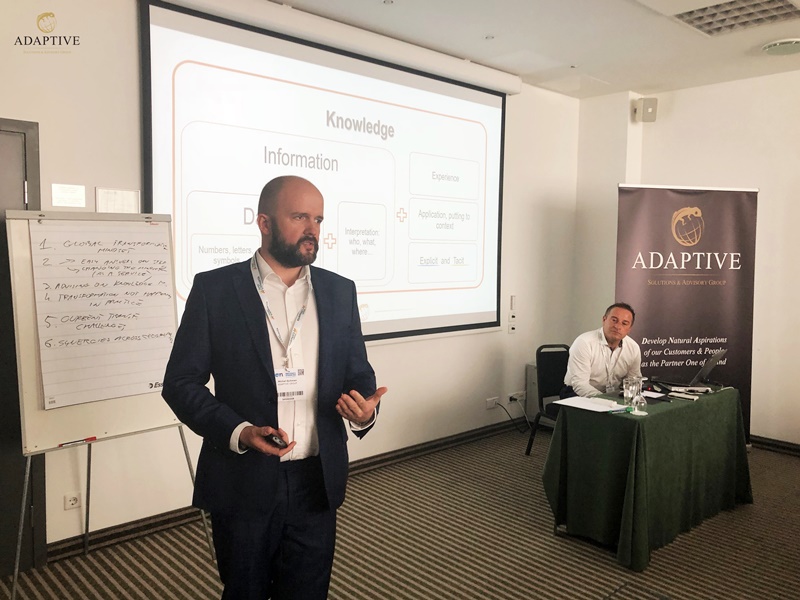
Michał Ejchman as a speaker during the Shared Services & Outsourcing Week in Vilnius
But is it not the case that sometimes the client feels what needs to be improved and just wants to double check with an external expert?
Yes, in many cases the client just needs external couple of eyes to challenge the idea or to shape it in a proper way. In vast majority of cases, such managers have huge experience and have this gut feeling that something should be improved in a given area. As the experts, we can challenge the idea, shape it and transform it into a business case, in a way that will show benefits from investment and provide effective results.
How do you see yourself in 5, 10 years?
I want to be a good person, build “bridges” and give people comfort of working and comfort of being a part of the team, a part of something bigger. I want to be a person who inspires and proposes some innovations and improvements or, at least, gives a space for a particular idea. This is for me the most important, more than getting to the top of the mountain. For me, being on the mountain trail is the biggest “ride” and fun. The biggest happiness is from being in the mountains, hike and being with others, coming together to the top and appreciating the current time and moment.
How about more down-to-earth plans? (laughs)
I want my three kids to be really good persons, I want them to have good lives. To grow their talents and allow them to develop in a way that will let them live decent lives and be good persons. Maybe inspirational ones in the future.
Thank you for conversation and I wish you inspiring mountain hikes on the way.
Thank you.
